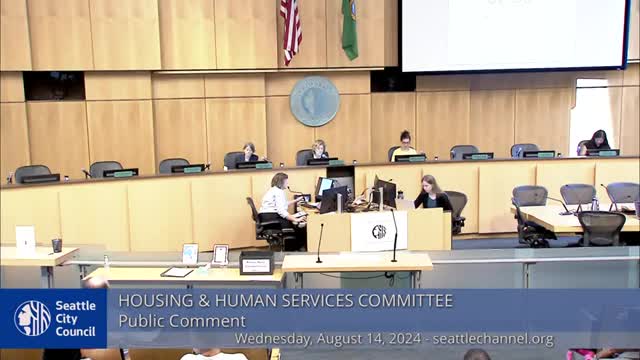Community leaders demand action on vital support programs
August 14, 2024 | Seattle, King County, Washington
This article was created by AI summarizing key points discussed. AI makes mistakes, so for full details and context, please refer to the video of the full meeting. Please report any errors so we can fix them. Report an error »

During a recent government meeting, community leaders voiced strong support for the continuation and expansion of the Law Enforcement Assisted Diversion (LEAD) program, highlighting its significant impact on vulnerable populations in Seattle. Gary Lee, co-chair of the CID Public Safety Council, emphasized the program's effectiveness in enhancing safety and providing essential support to individuals in need within the Chinatown-International District (CID).
Nathaniel Lyon, senior manager of community advocacy and outreach at the Ballard Food Bank, shared a compelling case of a client who had been homeless for 15 years. He praised the LEAD program for its ability to coordinate resources and provide meaningful assistance, stating that it has made more progress in the community than any other initiative he has encountered. Lyon underscored the importance of community-based interventions that respect individual needs while benefiting the broader community.
In contrast, Sarah Jane Siegfried raised concerns regarding the Multifamily Tax Exemption (MFG) program, arguing that it fails to provide affordable housing for those earning less than 60% of the area median income. She urged the council to allow the program to sunset at the end of the year, citing mismanagement and a lack of accountability as reasons for her stance.
Dan Godfrey from the Seattle Renters Commission expressed frustration over delays in appointing new commissioners, which has left the commission under-staffed and ineffective. He called for timely responses from the city council regarding commissioner approvals, stressing the need for a functional commission to address renter protections amid ongoing discussions about potential changes to housing policies.
The meeting highlighted the ongoing challenges and successes within Seattle's community support systems, with a clear call for continued investment in programs that address the needs of the most vulnerable residents.
Nathaniel Lyon, senior manager of community advocacy and outreach at the Ballard Food Bank, shared a compelling case of a client who had been homeless for 15 years. He praised the LEAD program for its ability to coordinate resources and provide meaningful assistance, stating that it has made more progress in the community than any other initiative he has encountered. Lyon underscored the importance of community-based interventions that respect individual needs while benefiting the broader community.
In contrast, Sarah Jane Siegfried raised concerns regarding the Multifamily Tax Exemption (MFG) program, arguing that it fails to provide affordable housing for those earning less than 60% of the area median income. She urged the council to allow the program to sunset at the end of the year, citing mismanagement and a lack of accountability as reasons for her stance.
Dan Godfrey from the Seattle Renters Commission expressed frustration over delays in appointing new commissioners, which has left the commission under-staffed and ineffective. He called for timely responses from the city council regarding commissioner approvals, stressing the need for a functional commission to address renter protections amid ongoing discussions about potential changes to housing policies.
The meeting highlighted the ongoing challenges and successes within Seattle's community support systems, with a clear call for continued investment in programs that address the needs of the most vulnerable residents.
Don't Miss a Word: See the Full Meeting!
Go beyond summaries. Unlock every video, transcript, and key insight with a Founder Membership.
✓
Get instant access to full meeting videos
✓
Search and clip any phrase from complete transcripts
✓
Receive AI-powered summaries & custom alerts
✓
Enjoy lifetime, unrestricted access to government data
30-day money-back guarantee

